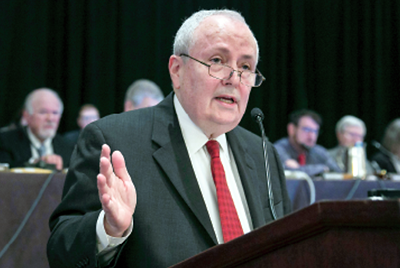APA Poll Finds Access to Care Stymied by ‘Phantom’ Networks in D.C.

A majority of network psychiatrists listed as practicing in the Washington, D.C., area by three major health plans in the District of Columbia health exchange are either not able to schedule an appointment or are not even reachable at the telephone numbers listed for enrollees to call.
That’s one of the findings by a team of researchers with the APA Foundation who telephoned a randomly selected sample of psychiatrists publicly listed as network psychiatrists for the three largest health insurance carriers on the DC Health Link Health Insurance Exchange. The study and its results were presented yesterday at APA’s 2016 Annual Meeting at the session “Constrained Access to Psychiatrists in Washington, D.C., Among the Largest Health Insurance Exchange Carriers’ Networks.”
Among the presenters were past APA President Steven Sharfstein, M.D. (pictured above); Steven Epstein, M.D., chair of the Department of Psychiatry at Georgetown University School of Medicine; James Griffith, M.D., chair of the Department of Psychiatry at George Washington University; Joyce West, Ph.D., M.P.P., policy research director of the APA Foundation; Irvin “Sam” Muszynski, J.D., director of the APA Office of Reimbursement Policy, and APA General Counsel Colleen Coyle, J.D.
Remarkably, close to a quarter of the phone numbers for the listed psychiatrists were either nonresponsive or nonworking. Moreover, only 14 percent of psychiatrists were able to schedule any appointment at all; in one plan, only 4 percent of psychiatrists were able to schedule an outpatient appointment.
The findings highlight a problem of “network adequacy” that has hindered access to care and the implementation of parity nationwide: the use by health plans of “narrow” or “phantom networks” that seem to advertise to enrollees an ample selection of psychiatrists, but which in fact offer very few real options for timely care. In many cases, listed providers are not accepting new patients, and others have moved out of the geographic area; in some cases, listed psychiatrists are retired from practice or deceased.
“Our investigation revealed that 86 percent of the psychiatrists listed in the network directories were either unreachable or not actually taking new outpatients,” Coyle said. “The callers had to call several times in many cases to get a response, and in the end only 14 percent of those listed as being available to patients were able to schedule new outpatient appointments, but with very long wait times in most cases.”
In the study, the research team compiled lists of all the psychiatrists who were publicly listed as being network psychiatrists in the online directories of the three largest health insurance carriers participating in the DC Health Link Health Insurance Exchange. Fifty psychiatrists were randomly selected from the psychiatrist network lists of each carrier.
Team members assessed whether the listed phone numbers were working, whether the psychiatrists practiced at the location, and whether someone at each of the offices could be contacted during a seven-day period from February 22 to March 21. At least three calls were placed to contact unreachable physicians’ offices.
These are the key findings:
- 23 percent of the phone numbers were nonworking or nonresponsive. For all the network psychiatrists studied, 23 percent of the listed phone numbers were either nonworking or nonresponsive, and no calls were returned over seven days.
- Only 51 percent of the psychiatrists were practicing at the listed phone numbers. 64 percent of Plan C’s network psychiatrists were not currently practicing at the listed phone numbers.
- Only 14 percent of the callers were able to schedule appointments. Among the listed Plan A network psychiatrists, only 4 percent were able to schedule appointments.
- Wait times for appointments were long. The average wait time for new outpatient appointments was nearly three weeks (19.1 days). Specifically, only 7 percent of the listed network psychiatrists were able to schedule a new outpatient appointment within two weeks, 3 percent were able to schedule an appointment within 15 to 28 days, and 4 percent had appointments only available for longer than three weeks. The rest of the listed psychiatrists were either not reachable or not accepting new patients.
“As the Affordable Care Act theoretically expands access to mental health and substance use disorder care, networks are shrinking both because psychiatrists are dropping out of the networks citing unreasonable administrative burden and low payment rates as reasons and because plans are narrowing their networks while providing robust directories of providers to attract purchasers to the plan,” Coyle said. “The net impact is that mental health patients are paying for care they cannot access, and those that are able to access care pay for that care out of pocket. Consumers are not getting the benefit of the mental health coverage they have paid for.”
(Image: David Hathcox)
|
|
|
|
|


